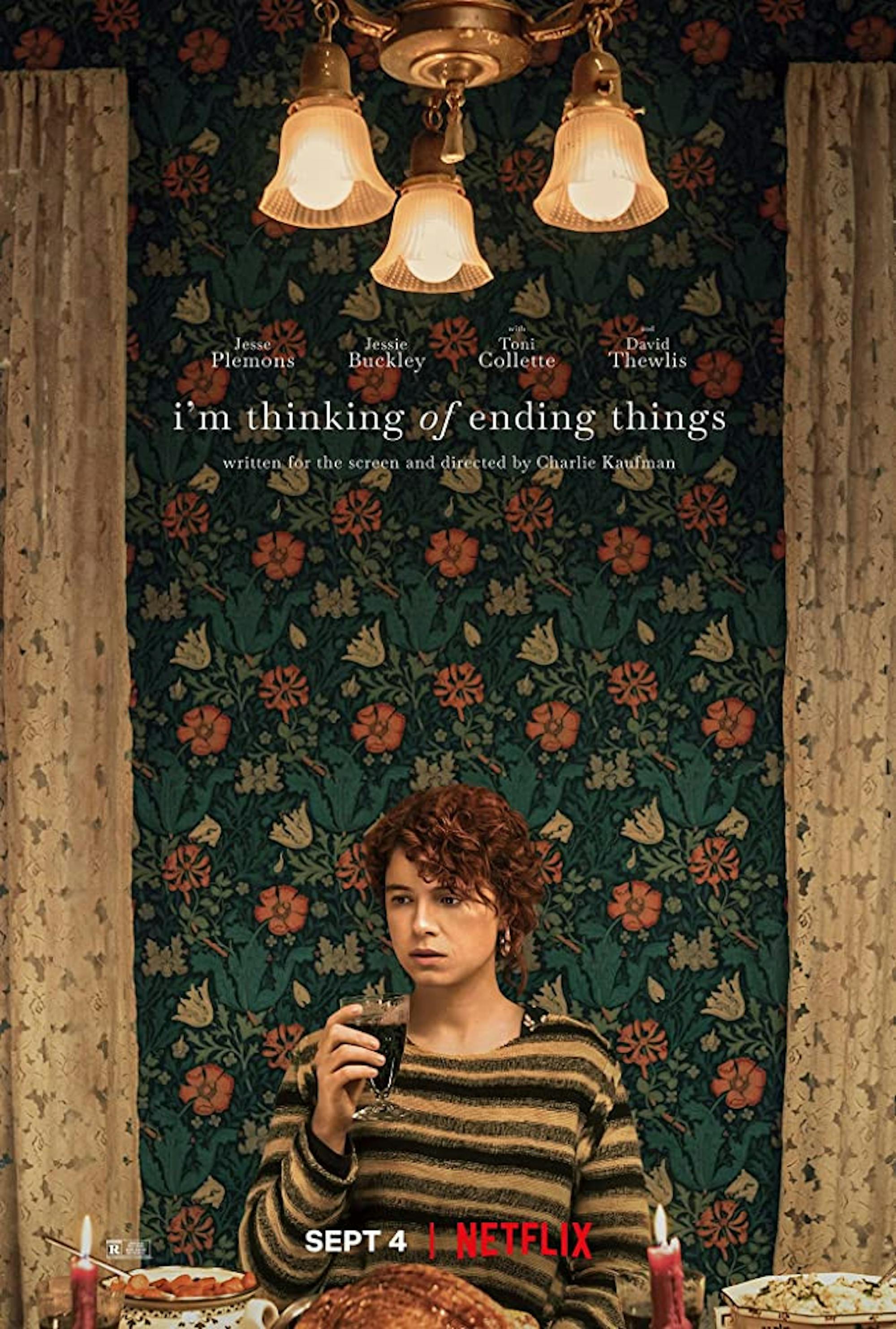One of the world’s most thoughtful and thought-provoking screenwriters returned to film with the Netflix release of “I’m Thinking of Ending Things” (2020).
Charlie Kaufman is Hollywood’sAtlas. His work holds up the weight of the increasingly-redundant industry with its originality. Ironically, it does so by examining the same general “thing” each time, the thing we all share yet understand the least about: the human condition. Thankfully, there’s so much to talk about in regards to the human condition.
“I’m Thinking of Ending Things” starts with shots of a quaint house, washing over each other while the narrating voice of Jessie Buckley (of “Wild Rose” (2018) and “Chernobyl” (2019)) contemplates human thought in a raging stream of consciousness. She tells us that she is visiting Jake’s parents on their farm before telling us that Jake is her boyfriend (played byJesse Plemonsof “Friday Night Lights” (2006–11) and “Breaking Bad” (2008–13)). At this point the order of her thoughts seem to be an inconsequential confirmation of Jake’s relation to her. As the film unfolds, however, this specificity can be seen in a completely different light.
Other little moments are sprinkled throughout the first half of the screenplay — in dialogue, visuals and character background — that hint at a very different reality to what is portrayed in the main storyline. For example, as the young woman waits for Jake, she looks up at a building. The camera quickly shifts to an old man (Guy Boyd), back turned to the camera, looking down out his window. It switches back to her, uncomfortable until she sees her boyfriend pulling up to the curb. The camera switches once more to the man, except now he is clearly younger. Peculiarly, the one shot of the woman looking at the building does not show any of the windows being looked out of by a creepy old man, and the shot of the age-changing men shows them looking out to a sunny view, not a snowy one. In a matter of just this one minute, an incredible number of oddities are subtly introduced.
At Jake’s parents’ farm,Kaufman throws in gags that horror films often use as set-up for big scares — a door opening on its own, infesting rot and unsettling scratch marks, to name a few. The aura of the visit has all the makings of a horror film situation.Kaufman even recruited Toni Collette to play Jake’s mom — the actress who gave one of the best horror film performances of all time in “Hereditary” (2018). Collette and David Thewlis (of “Harry Potter” (2001–11)) are equally brilliant to the two leads, playing Jake’s parents at multiple intervals of life and health.
But this film is not a horror film. Or, at least, not in the traditional sense.
The horror here is regret and loneliness in the face of aging. The film spectacularly captures what it is like to fantasize about missed opportunities, something that — to some degree — most people will have experienced at some point in their lives. It looks at these concepts through the secondary storyline, that of the old man staring out of a window at the beginning of the film.
As the film nears the interaction of the two separate storylines, we realize that they were never truly separate. Jake, the young woman and the old man are inherently tied to one another.
This interaction plays out in Jake’s old high school, where Jake and his girlfriend stop against the wishes of the latter. The old man happens to be the high school’s janitor. The janitor and the young woman interact, and she asks him if he has seen Jake. He says he has not. Eventually she finds Jake on her own and they — or, rather, people who are similarly dressed to them — perform an almost five-minute-long interpretive dance.
The focus finally stays on the old man, who has made his way to his truck. What unfolds in these last 10 minutes of the film is an array of the bizarre. The old man hallucinates everything from a talking pig to Jake’s performing a song from the musical “Oklahoma!,” wearing makeup to look elderly.
“I’m Thinking of Ending Things” is undoubtedly a Kaufman film, and a Kaufman film is never a bad thing. Nevertheless, it feels as if he merely transposed the exact same themes of “Synecdoche, New York” (2008) — an earlier film of his — and decided to give it a horror feel. While “Synecdoche, New York” felt innovative with how quickly it plunged into its philosophical, paradoxical and mind-bending ways, “I’m Thinking of Ending Things” took the tried-and-true horror approach of a descent into such chaos. Again, the film is not bad by any means — it is just not as original as Kaufman can be.
With that said, the film was as thought-provoking as anything Kaufman’s ever done. Once you finish it, you’ll start to connect more and more dots until you’re pondering the significance of each frame, of each cinematic sleight of hand, of each moment that felt out of place initially, of each word and the way it was said. The horror approach did not land all that well and felt unnecessary for the most part. Sure, it was an interesting foray for Kaufman, who hasn’t ever gone too far in that direction, and he deserves credit for trying. Luckily, the horror tinge was merely a tinge and did not heavily distract from the wonderful parts of the film — the concepts, the acting (Oscar nominations are definitely possible), the surreal final third of the film.
“I’m Thinking of Ending Things” is not Kaufman’s best, but it is still better than most of Hollywood’s rest.






